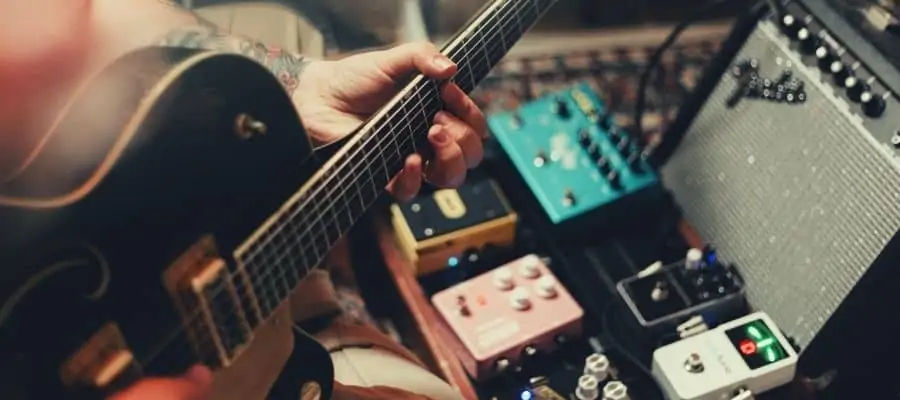Scales are the building blocks of music. They’re essential for finger agility, fretboard mastery, and musical understanding. But how often should you be practicing these scales to make meaningful progress?
You should practice guitar scales every day to see significant improvement. Daily practice helps build muscle memory and reinforces your understanding of scale patterns. Aim for at least 10-15 minutes if you’re a beginner or strapped for time. Only learn up to 2 scales at a time, and as you get more comfortable, gradually extend your practice sessions.
In this article, I’ll delve deeper into the ideal frequency and duration of practicing scales. I’ll also share tips on how to make your practice sessions more effective and enjoyable.
Ideal Frequency of Practicing Guitar Scales

As a guitarist, practicing scales is an essential part of your training. It helps you develop finger dexterity, improve fretboard knowledge, and enhance overall playing ability.
Here are some guidelines to help you find the ideal frequency for your practice sessions.
- Practice scales daily: To make significant progress in your guitar playing, you need to practice scales every day. This helps you build muscle memory and retain the knowledge you’ve gained. Even if you only have a few minutes to spare, it’s better to practice scales for a short time every day than to practice for hours only once a week.
- Start with shorter sessions: If you’re new to practicing scales or have limited time, start with shorter sessions. Aim for 10-15 minutes daily and gradually increase the time as you become more comfortable with the exercises.
- Vary your practice routine: Practicing scales can become monotonous if you do the same daily exercises. To keep things interesting, vary your practice routine by using different positions, playing patterns, and rhythms. This helps you develop your skills in different areas and prevents boredom.
- Set realistic goals: When practicing scales, set realistic and achievable goals. For example, aim to play a particular scale at a certain tempo or master a specific pattern. This helps you stay motivated and gives you a sense of accomplishment when you achieve your goals.
How Long Should Each Practice Session Last?

It’s important to have a consistent practice routine when practicing guitar scales. Part of that routine includes deciding how long each practice session should last. Here’s what I recommend:
- Aim for practice around 30 minutes per session. This is the minimum time needed to see progress and make improvements.
- Aim for 60-90 minute practice sessions if you have more time. This will allow you to dive deeper into your scales and really focus on technique.
- Break up longer practice sessions into smaller chunks. For example, you could practice for 30 minutes in the morning and 30 minutes in the evening.
It’s important to note that the length of your practice session is less important than the consistency of your practice routine. It’s better to practice for 30 minutes every day than to practice for 2 hours once a week.
Try using a timer or setting specific goals for each session to maximize your practice time. This will help you stay focused and motivated. And remember to take breaks! Giving your hands and mind a rest is important to avoid burnout.
Tips for Effective Practice

When practicing guitar scales, it’s important to have a plan and approach that will help you get the most out of your practice time. Here are some tips that I’ve found to be effective:
- Set a specific goal for each practice session. Before practicing, decide what you want to accomplish during your practice time. This could be mastering a particular scale or improving your speed and accuracy. A specific goal will help you stay focused and motivated during your practice session.
- Start slow and gradually increase speed. When practicing guitar scales, it’s important to start slow and focus on playing each note cleanly and accurately. As you become more comfortable with the scale, gradually increase your speed. This will help you build muscle memory and improve your overall technique.
- Use a metronome. A metronome is a great tool for practicing guitar scales. It will help you stay on time and ensure that you’re playing each note at the correct tempo. Start at a slow tempo and gradually increase the speed as you become more comfortable with the scale.
- Practice in different keys and positions. Once you’ve mastered a particular scale, try practicing it in different keys and positions. This will help you become more comfortable with the fretboard and improve your overall understanding of music theory.
- Start easy. If you are a beginner guitarist, start from the fundamental scales like the chromatic, pentatonic, major, and minor scales. After you get comfortable with them along the fretboard, you can move on to the more complex scales like the modes, dominant 7th, harmonic minor scales, and more.
- Take breaks and stay hydrated. Practicing guitar scales can be physically demanding, so taking breaks and staying hydrated is important. Take a short break every 20-30 minutes to stretch and rest your hands. Drink plenty of water to stay hydrated and avoid cramping.
- Practice vertically and horizontally. You should practice vertically and horizontally to get familiar with the fretboard and the scales. Vertical scales are great for playing in specific positions, while horizontal scales are crucial to changing positions and more complex patterns.
- Practice at most 2 scales at a time. It is important to give each scale enough time to engrave them in your muscle memory. Practice one or two scales simultaneously to internalize them before moving to more complex scales.
- Use symmetrical patterns. A good way to learn and memorize the scale shapes and positions. A symmetrical pattern is a note group that can be played repeatedly in different octaves. You use the same shapes over different positions and strings, making it easier to learn and play.
- Learn the roots, the 3rds, and the 6ths. When practicing scales, it is important to learn the positions of the root notes, the 3rds, and the 6ths. These are musically important notes that give the character to most scales. For a practice example, you can play a scale with two notes at a time, picking the root and the 3rd or the root and the 6th.
Common Mistakes to Avoid

When practicing guitar scales, there are several common mistakes that many guitarists make. Avoiding these mistakes will help you get the most out of your practice sessions and improve your playing faster.
Here are some common mistakes to avoid:
- Not using a metronome: Practicing without a metronome can lead to inconsistent timing and poor rhythm. Using a metronome will help you develop a strong sense of timing and improve your overall playing.
- Practicing too fast: Playing scales too quickly can lead to sloppy playing and mistakes. Start practicing at a slow and steady tempo, gradually increasing the speed as you become more comfortable with the scale.
- Neglecting technique: Poor technique can lead to pain and discomfort in your hands, arms, and shoulders. Ensure you use proper technique when playing scales, including proper hand and finger placement.
- Not practicing consistently: Practicing scales occasionally will only do a little to improve your playing. Consistency is key when it comes to practicing guitar scales. Make sure you are practicing regularly, even if it’s just for a few minutes each day.
- Not focusing on musicality: While it’s important to practice scales for technical proficiency, it’s also important to focus on the musicality of the scale. Try experimenting with different rhythms and phrasing to make the scale more interesting.
Conclusion
Practicing guitar scales daily is your ticket to becoming a more proficient and versatile musician.
Aim for consistency, starting with at least 10-15 minutes daily and gradually increasing your practice time. Remember to set achievable goals, mix up your routine to avoid monotony, and use a metronome for timing accuracy.
If you found this article useful, you may want to save this pin below to your Guitar board.

Recent Posts
When learning new songs have you noticed that some of the chord sequences sound really good? But when you tried to come up with your own chord sequence, or as we call it chord progression, you found...
Some guitarists insist on buying an expensive amplifier with their electric guitar. They assume that this is a must for every type of guitarist out there. However, in some situations, this isn’t...

